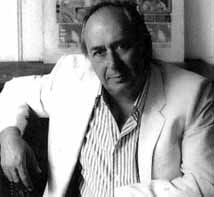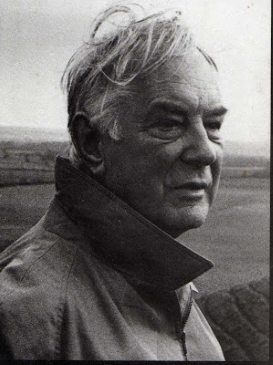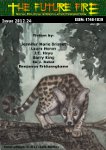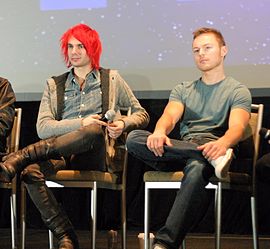
James Graham Ballard was an English novelist and short story writer, satirist and essayist known for psychologically provocative works of fiction that explore the relations between human psychology, technology, sex and mass media. Ballard first became associated with New Wave science fiction for post-apocalyptic novels such as The Drowned World (1962), but later courted political controversy with the short-story collection The Atrocity Exhibition (1970), which includes the story "Why I Want to Fuck Ronald Reagan" (1968) and the novel Crash (1973), a story about car-crash fetishists.
The New Wave was a science fiction style of the 1960s and 1970s, characterized by a great degree of experimentation with the form and content of stories, greater imitation of the styles of non-science fiction literature, and an emphasis on the psychological and social sciences as opposed to the physical sciences. New Wave authors often considered themselves as part of the modernist tradition of fiction, and the New Wave was conceived as a deliberate change from the traditions of the science fiction characteristic of pulp magazines, which many of the writers involved considered irrelevant or unambitious.

Sylvia Plath was an American poet, novelist, and short story writer. She is credited with advancing the genre of confessional poetry and is best known for The Colossus and Other Poems (1960), Ariel (1965), and The Bell Jar, a semi-autobiographical novel published shortly before her suicide in 1963. The Collected Poems was published in 1981, which included previously unpublished works. For this collection Plath was awarded a Pulitzer Prize in Poetry in 1982, making her the fourth to receive this honour posthumously.

Edward James Hughes was an English poet, translator, and children's writer. Critics frequently rank him as one of the best poets of his generation and one of the twentieth century's greatest writers. He was appointed Poet Laureate in 1984 and held the office until his death. In 2008 The Times ranked Hughes fourth on its list of "The 50 greatest British writers since 1945".
This article contains information about the literary events and publications of 1984.

China Tom Miéville is a British speculative fiction writer and literary critic. He often describes his work as "weird fiction", and is allied to the loosely associated movement of writers called New Weird.

The Notting Hill Carnival is an annual Caribbean Carnival event that has taken place in London since 1966 on the streets of the Notting Hill area of Kensington, over the August Bank Holiday weekend.

John Joseph Vincent Kessel is an American author of science fiction and fantasy. He is a prolific short story writer, and the author of four solo novels, Good News From Outer Space (1989), Corrupting Dr. Nice (1997), The Moon and the Other (2017), and Pride and Prometheus (2018), and one novel, Freedom Beach (1985) in collaboration with his friend James Patrick Kelly. Kessel is married to author Therese Anne Fowler.

Geoffrey Edward Harvey Grigson was a British poet, writer, editor, critic, exhibition curator, anthologist and naturalist. In the 1930s he was editor of the influential magazine New Verse, and went on to produce 13 collections of his own poetry, as well as compiling numerous anthologies, among many published works on subjects including art, travel and the countryside. Grigson exhibited in the London International Surrealist Exhibition at New Burlington Galleries in 1936, and in 1946 co-founded the Institute of Contemporary Arts. Grigson's autobiography The Crest on the Silver was published in 1950. At various times he was involved in teaching, journalism and broadcasting. Fiercely combative, he made many literary enemies.
Emma Christina Tennant FRSL was an English novelist and editor of Scottish extraction, known for a post-modern approach to her fiction, often imbued with fantasy or magic. Several of her novels give a feminist or dreamlike twist to classic stories, such as Two Women of London: The Strange Case of Ms Jekyll and Mrs Hyde. She also published under the pseudonym Catherine Aydy.

Fiction is an American literary magazine founded in 1972 by Mark Jay Mirsky, Donald Barthelme, and Max Frisch. It is published by the City College of New York.
New Yorkshire Writing was a British literary quarterly which briefly gained one of the largest circulations of what is commonly called a "little magazine", distributed as a supplement in 13,000 copies of The Month In Yorkshire, the arts listings magazine then published by the Yorkshire Arts Association (YAA). It had an estimated readership of 45,000 according to an announcement by YAA's Director Michael Dawson. He proposed in a launch press release that the magazine's distribution method "would bring serious creative fiction and poetry to a much larger and more varied audience than usual". All contributors were to be paid, something that only a handful of British little magazines were able to do.

The Future Fire is a small-press, online science fiction magazine, run by a joint British–US team of editors. The magazine was launched in January 2005 and releases issues four times a year, with stories, articles, and reviews in both HTML and PDF formats. At times issues appeared more sporadically than this.

Julian Baggini is a philosopher, journalist and the author of over 20 books about philosophy written for a general audience. He is co-founder of The Philosophers' Magazine and has written for numerous international newspapers and magazines. In addition to writing on the subject of philosophy he has also written books on atheism, secularism and the nature of national identity. He is a patron of Humanists UK.

Science Fiction Monthly was a British science fiction magazine published from 1974 to 1976 by New English Library. Launched in response to demand from readers for posters of the cover art of New English Library's science fiction paperbacks, it was initially very successful—its circulation had reached 150,000 by the third issue. It reprinted artwork by Chris Foss, Jim Burns, Bruce Pennington, Roger Dean, and many others. Well-known writers who appeared in its pages included Brian Aldiss, Bob Shaw, Christopher Priest, and Harlan Ellison. High production costs meant that a large circulation was necessary to sustain profitability, and when circulation fell to about 20,000 after two years NEL ceased publication. A new magazine, S.F. Digest, was launched in its stead but lasted only one issue.

Benjamin Cook is a British writer, journalist, video editor, YouTuber, and a regular contributor to Radio Times and Doctor Who Magazine. He has also been published in The Daily Telegraph, TV Times, Filmstar, Cult Times, TV Zone and The Stage, and is the author of Doctor Who: The New Audio Adventures – The Inside Story. In 2008, BBC Books published Doctor Who: The Writer's Tale, based on a year-long email correspondence between Cook and Doctor Who executive producer Russell T Davies. A revised and updated paperback edition, The Writer's Tale: The Final Chapter, was published in January 2010.
Harry Fainlight (1935–1982) was a British/American poet associated with the Beats movement.

Once A Week was a British weekly illustrated literary magazine published by Bradbury & Evans from 1859 to 1880. According to John Sutherland, "[h]istorically the magazine's main achievement was to provide an outlet for [an] innovative group of illustrators [in] the 1860s."
Redstone Press is a London-based art book publisher that was founded in 1986 by Julian Rothenstein, the son of English portrait painter Duffy Ayers and her first husband, the painter and printmaker Michael Rothenstein. Publisher Julian Rothenstein, who has been called "a one-man art movement", is also the press's editor and designer.

Blenheim Crescent is a street in the Ladbroke Estate area of the Notting Hill district of west London.














